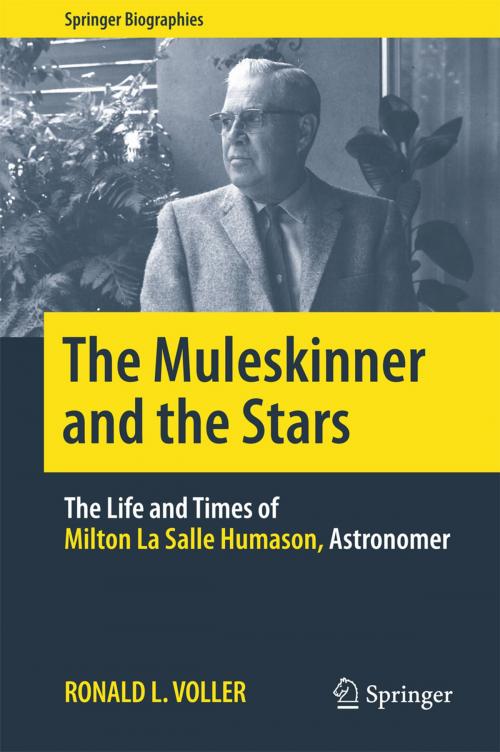The Muleskinner and the Stars
The Life and Times of Milton La Salle Humason, Astronomer
Nonfiction, Science & Nature, Science, Physics, Astronomy, Other Sciences, History| Author: | Ronald L. Voller | ISBN: | 9781493928804 |
| Publisher: | Springer New York | Publication: | August 28, 2015 |
| Imprint: | Springer | Language: | English |
| Author: | Ronald L. Voller |
| ISBN: | 9781493928804 |
| Publisher: | Springer New York |
| Publication: | August 28, 2015 |
| Imprint: | Springer |
| Language: | English |
This is the story of the astronomer Milton La Salle Humason, whose career was integral to developing our understanding of stellar and universal evolution and who helped to build the analytical basis for the work of such notable astronomers and astrophysicists as Paul Merrill, Walter Adams, Alfred Joy, Frederick Seares, Fritz Zwicky, Walter Baade and Edwin Hubble.
Humason’s unlikely story began on the shores of the Mississippi River in Winona, Minnesota, in 1891 and led to the foot of Mount Wilson outside Los Angeles, California, twelve years later. It is there where he first attended summer camp in 1903 and was captivated by its surroundings. The mountain would become the backdrop for his life and career over the next six decades as he helped first build George Ellery Hale’s observatory on the summit and then rose to become one of that institution’s leading figures through the first half of the twentieth century.
The story chronicles Humason’s life on Mount Wilson, from his first trip to the mountain to his days as a muleskinner, leading teams of mules hauling supplies to the summit during the construction of the observatory, and follows him through his extraordinary career in spectroscopy, working beside Edwin Hubble as the two helped to reconstruct our concept of the universe. A patient, knowledgeable and persistent observer, Humason was later awarded an honorary doctorate for his work, despite having no formal education beyond the eighth grade. His skill at the telescope is legendary. During his career he photographed the spectra of stars, galaxies and other objects many thousands of times fainter than can be seen with the naked eye and pushed the boundary of the known universe deeper into space than any before him. His work, which included assisting in the formulation of Hubble’s Law of redshifts, helped to set the field of cosmology solidly on its foundation.
Milton Humason was one of the most charismatic characters in science during the first half of the 20th century. Uneducated, streetwise, moonshining, roguish, humble and thoroughly down to earth, he rose by sheer chance, innate ability and incredible will to become the leading deep space observer of his day. “The Renaissance man of Mount Wilson,” as Harlow Shapley once referred to him, Humason’s extraordinary life reminds us that passion and purpose may find us at any moment.
This is the story of the astronomer Milton La Salle Humason, whose career was integral to developing our understanding of stellar and universal evolution and who helped to build the analytical basis for the work of such notable astronomers and astrophysicists as Paul Merrill, Walter Adams, Alfred Joy, Frederick Seares, Fritz Zwicky, Walter Baade and Edwin Hubble.
Humason’s unlikely story began on the shores of the Mississippi River in Winona, Minnesota, in 1891 and led to the foot of Mount Wilson outside Los Angeles, California, twelve years later. It is there where he first attended summer camp in 1903 and was captivated by its surroundings. The mountain would become the backdrop for his life and career over the next six decades as he helped first build George Ellery Hale’s observatory on the summit and then rose to become one of that institution’s leading figures through the first half of the twentieth century.
The story chronicles Humason’s life on Mount Wilson, from his first trip to the mountain to his days as a muleskinner, leading teams of mules hauling supplies to the summit during the construction of the observatory, and follows him through his extraordinary career in spectroscopy, working beside Edwin Hubble as the two helped to reconstruct our concept of the universe. A patient, knowledgeable and persistent observer, Humason was later awarded an honorary doctorate for his work, despite having no formal education beyond the eighth grade. His skill at the telescope is legendary. During his career he photographed the spectra of stars, galaxies and other objects many thousands of times fainter than can be seen with the naked eye and pushed the boundary of the known universe deeper into space than any before him. His work, which included assisting in the formulation of Hubble’s Law of redshifts, helped to set the field of cosmology solidly on its foundation.
Milton Humason was one of the most charismatic characters in science during the first half of the 20th century. Uneducated, streetwise, moonshining, roguish, humble and thoroughly down to earth, he rose by sheer chance, innate ability and incredible will to become the leading deep space observer of his day. “The Renaissance man of Mount Wilson,” as Harlow Shapley once referred to him, Humason’s extraordinary life reminds us that passion and purpose may find us at any moment.















